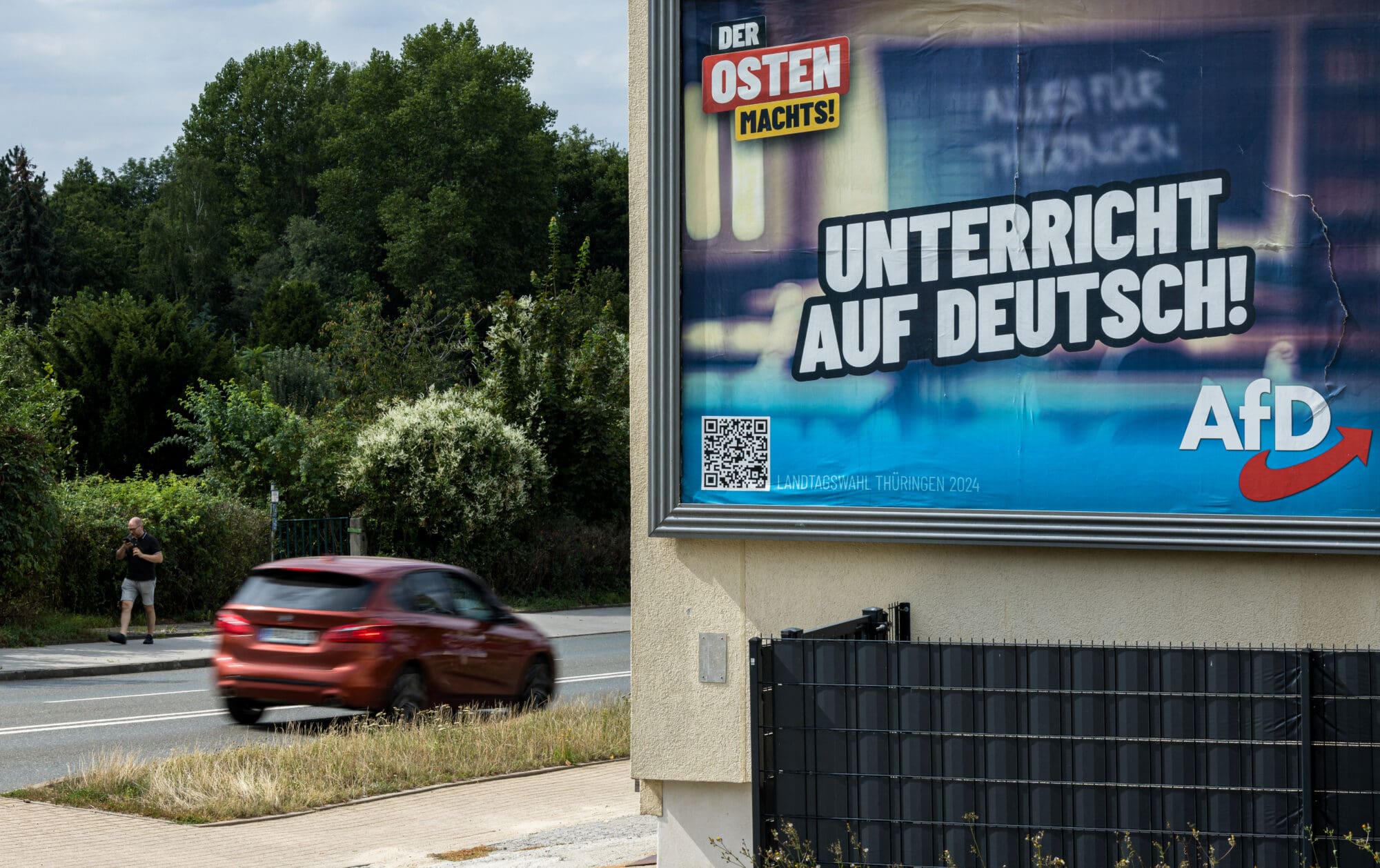
JENS SCHLUETER / AFP
The two anti-immigration parties dominating the polls before crucial regional elections in Germany have called for an end to uncontrolled migration, following the terror attack in Solingen last week.
The tough stance taken by the populists connects with growing public outrage at a deteriorating security situation.
While the German leftist government is still debating whether to deport failed asylum seekers to countries such as Afghanistan and Syria, Alice Weidel—co-leader of the right-wing opposition Alternative für Deutschland (AfD) party—has called for a complete halt to immigration for at least five years, saying that without a U-turn on migration, Germany faces an “irreversible civilisational decline.”
She said Germany’s borders must be closed, and failed asylum seekers must be immediately returned to their country of origin—especially Afghans, Syrians, and Iraqis who commit proportionately more crimes than residents of other nationalities.
Ich fordere ein Moratorium: Einwanderungs-, Aufnahme- & Einbürgerungsstopp für mind. 5 Jahre. Daneben sind die Grenzen zu schließen & die Personengruppen mit der höchsten Kriminalitätsbelastung – also vor allem sich illegal in Deutschland aufhaltende Afghanen, Syrer & Iraker -… pic.twitter.com/L3vjAYN2QN
— Alice Weidel (@Alice_Weidel) August 26, 2024
Sahra Wagenknecht, leader of the left-wing nationalist Bündnis Sahra Wagenknecht (BSW), called for an end to “uncontrolled migration,” saying it has fuelled increasing crime and violence in the country:
How can we believe that mainly young men would abide by the law when their first experience with Germany is that illegal entry is rewarded with a residence permit and financial benefits?”
Immer wieder werden Menschen in #Deutschland ermordet von Leuten, die gar nicht mehr hier sein dürften. Das Kernproblem ist unkontrollierte #Migration – und die Untätigkeit der #Ampel. Wir brauchen eine #Flüchtlingspolitik wie in Dänemark. #Solingenhttps://t.co/rup5f9SLNq pic.twitter.com/5JSeB70PkU
— Sahra Wagenknecht (@SWagenknecht) August 26, 2024
As we reported, a 26-year-old Syrian man with a knife attacked festivalgoers in the western German city of Solingen on Friday, August 23rd. Three people were killed, and eight injured. The Islamic State terror group claimed responsibility for the attack. The perpetrator, a failed asylum seeker, should have been deported last year, but had not been at his refugee accommodation when authorities tried to enforce the measure.
The case is similar to that of an Afghan man who murdered a policeman in Mannheim at the end of May. He, too, was a failed asylum seeker who had been living in the country illegally for nine years.
The attack in Solingen has put the spotlight back on the serious consequences of migration, and the government’s failure to deal with migrant criminals. The country has suffered a wave of knife attacks committed by mostly Afghan and Syrian migrants.
The threat also puts the spotlight on AfD and BSW, the two German parties with the seemingly toughest migration policies, despite being on opposite sides of the political spectrum.
Both parties are expected to do well in the upcoming regional elections in the eastern states of Saxony and Thuringia on September 1st, Sunday, as well as in Brandenburg on September 22nd. The two parties are projected to get between 40% and 50% of all votes—a sign that Germans in the East are fed up with the lax migration policies of the Berlin elite. Though the most recent party polling numbers were published before the attack in Solingen, experts believe the shocking assault could politically benefit AfD and BSW, further increasing their popularity.
Tragedies like the one in Solingen “can have an impact on current voting behaviour and play into the hands of the populists,” Norbert Schäuble of the Sinus research institute in Heidelberg told Handelsblatt. The biggest problem for the mainstream parties who have held power in recent decades—the currently governing Social Democrats, the Greens, the liberal FDP, as well as the opposition centre-right CDU/CSU—is that people have lost trust in them, the institute assessed.
CDU leader Friedrich Merz has been trying to appear tough, calling for an end to migration from Afghanistan and Syria, but voters will remember that his predecessor Angela Merkel—former head of the party, and former Chancellor (2005-2021)—oversaw the influx of hundreds of thousands of migrants.
